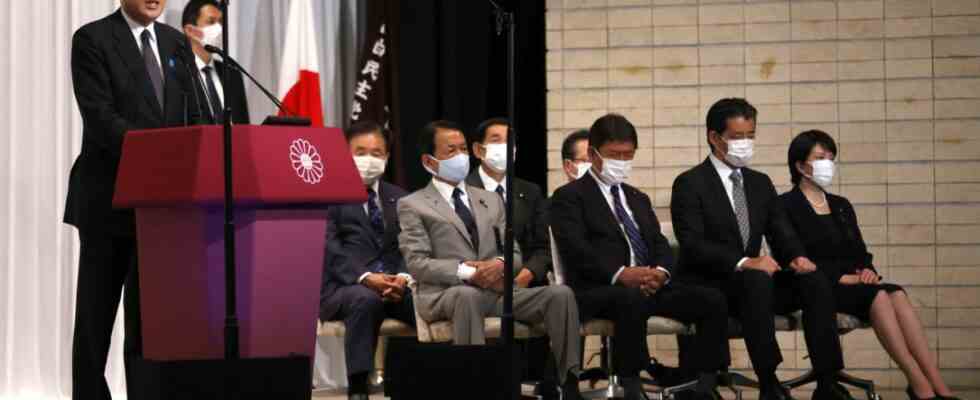The elite of Japan’s ruling LDP party were still sad, so they couldn’t celebrate, although they had reason to celebrate. Her victory in the upper house election on Sunday was overwhelming. She won 63 of the 125 seats available. She cemented her power with smaller coalition partner Komeito. Together with the two right-wing opposition parties, Nippon Ishin no Kai and DPP, she won the two-thirds majority she needs to push ahead with the long-awaited amendment to the 1947 pacifist constitution. It was the LDP’s best election result since 2013.
But of course that didn’t change the fact that the party is under the impression of the assassination attempt on Shinzō Abe. Two days before the election she lost her record prime minister and former president. Prime Minister Fumio Kishida and the other top officials wore black armbands and dark clothing. There was a minute’s silence and hardly a smile. The loss of the influential grandee weighed too heavily – LDP leaders had nothing open to celebrate that night. Not even about this historic result, which marks a turning point in Japan’s effort to once again become a nation with military capabilities.
The party itself probably does not even know how the LDP will fill the internal power vacuum created by Shinzō Abe’s violent death. But after the clear victory, it quickly became clear that the right-wing conservative forces will uphold the legacy of their idol. “It’s important to protect the conservative fire that he lit,” said LDP chief strategist Sanae Takaichi, a hardliner close to Abe. For them, the constitutional amendment was expressly part of it. Secretary-General Toshimitsu Motegi, the LDP’s number two, made a similar statement. And Kishida, number one, said: “We will continue to deepen the parliamentary debate on the constitution so that a concrete amendment proposal can be worked out.”
The messages were unmistakable: 77 years after Imperial Japan’s surrender as an aggressor in World War II, it is increasingly likely that post-war Japan will once again be able to officially use warfare in military conflicts.
Russia’s attack on Ukraine has changed the situation
The election success was confirmation for Kishida, who has only been Japan’s prime minister since October. As such, he has many complicated construction sites. For example, he has to meet climate targets and lead the nation out of the Corona crisis that is slowing the country down. He will probably also revise the Abenomics strategy with which Shinzō Abe gave the nation slight growth during his second term from 2012 to 2020; at least Fumio Kishida has promised a “new capitalism”. But security policy is also an important issue at this time, and the House of Lords election has brought a new perspective to the island nation in this regard.
Apparently, the election was only for half of the 248 seats in the weaker “House of Councilors” of the national two-chamber parliament. In reality it was about much more. The LDP, Komeito, Nippon Ishin no Kai and DPP had already won a two-thirds majority in the general election in October. But in order to be able to obtain a referendum on the constitutional question, they needed one in the upper house as well. Changing the pacifist constitution is a long-cherished wish of right-wing circles in Japan. It strikes her national pride that Article 9 commits her beloved island nation to non-violence in all circumstances. Although Japan has so-called self-defense forces, they are not actually allowed to have any means of war at their disposal. Changing that was always one of the most important goals for Shinzō Abe as head of government. But he couldn’t. The two-thirds majority was missing. And Komeito was against it.
Russia’s attack on Ukraine has changed the situation. Fears of the authoritarian neighbors Russia, China and North Korea are increasing. During the election campaign, the LDP therefore campaigned for a new security policy, according to which Japan should be able to retaliate against attacks with its own missiles in the future. The current constitution would forbid that. That’s why the LDP and the other right-wingers want reform. Recently, the actually pacifist Komeito is also in favor of it. And the centre-left opposition?
It is finally so weak that it no longer has anything to say in this debate. The centrist CDP, the main opposition party, lost five seats. Its founder, Yukio Edano, made room for a fresh start after losing in the general election last October. The new boss Kenta Izumi has not brought fresh impetus to the party. He sounded oddly lethargic and unworldly when he said after the recent defeat: “My understanding is that the voters don’t want to leave the LDP and entrust us with the leadership of the government.”
Japan’s democracy is in crisis. Not just since this Sunday, but the upper house election showed that parliament is drifting more and more in one direction. The right-wing majority is now so large that progressive attitudes actually no longer stand a chance. And the turnout showed that politics is not very close to the people. It was higher than in previous upper house elections. But it was still only 52 percent.
This upper house election pointed the way for the future of Japan. Nevertheless, almost every second person in the country did not go. This realization stood for a problem that Fumio Kishida should actually address: the great indifference of the masses in Japan.

